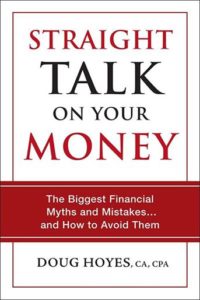 A personal finance book written by an insolvency trustee can’t be interesting, right? Wrong. Straight Talk On Your Money by Doug Hoyes promises to cut through the biggest myths and mistakes about money and, boy, does it deliver!
A personal finance book written by an insolvency trustee can’t be interesting, right? Wrong. Straight Talk On Your Money by Doug Hoyes promises to cut through the biggest myths and mistakes about money and, boy, does it deliver!
Full disclosure: I’ve known Doug for a while. I was a guest on his podcast when I first burned my mortgage and more recently when I released my first book (not to boast, but it’s the most downloaded podcast episode of the year). When Doug told me he was writing a book about personal finance, I couldn’t wait to read it. And I can say it certainly lives up to expectations.
The Dangers of Carrying Too Much Debt
With low interest rates around for so long, many of us no longer fear debt like our parents and grandparents used to. But maybe we should. Low interest rates won’t be around forever – the two rate hikes by the Bank of Canada this year are living proof.
In his book, Doug draws on his 30 year career as an insolvency trustee with interesting and relatable anecdotes from actual clients. The book opens with a powerful story that illustrates firsthand the dangers of too much debt.
Growing up, a young Doug Hoyes worked at the local hardware story on Saturdays and during the summer. The business looked to be thriving – until one day Doug’s father broke some bad news to him: the bank had called the loan and the store went bankrupt. It’s only later that Doug put the pieces of the puzzle together and realized that how too much debt led to the business’s demise.
Biggest Financial Myths Busted
Doug plays devil’s advocate throughout the book, challenging some of the widely accepted conventional wisdom in the financial industry. Some busts myth like why a good credit score may be harmful to your financial well-being and why you should never pay a collection agent.
I especially enjoyed the chapters on housing. The chapter entitled “the bigger the mortgage, the better” is a myth I speak at great length in my book. Although a mortgage is generally considered good debt, too big of a mortgage can strangle you financially, leaving you “house rich, cash poor,” with little money to save, let alone have fun.
I didn’t agree with everything in Doug’s book – for example, how getting into the habit of saving money makes no sense if you owe high-interest debt – but it got me thinking. I’ve read plenty of personal finance books and this one stands out from the crowd. Doug isn’t afraid to tell it as it is. He builds trust with the reader and even goes as far to say not to take his advice as gospel either.
Not Your Typical Personal Finance Book – and That’s a Good Thing
The book is an easy read with its conversational, jargon-free tone. I read throughout half of the book in one afternoon. You can easily put it down and pick up where you left off. The book appeals to everyone, not just those into the personal finance genre.
The book reinforces the fact that you shouldn’t just take expert advice as fact. Most of the times they have something to gain. And sometimes their interests aren’t aligned with yours. For example, when you’re buying a home, you want to buy it for the least amount of money, but if you end up in a bidding war and spend more, your real estate agent actually earns a higher commission. How’s that for a conflict of interest? Truth be told, the majority of agents are honest, hardworking individuals, but it just goes to show the importance of looking out for your own interest because nobody cares more about your money than you.
Straight Talk On Your Money is the must-read personal finance book this fall. It’s the perfect book to read right before the holidays, when our spending goes into overdrive. You’re guaranteed to be a smarter consumer after reading this book and do a better job of looking out for your own financial interests going forward.
Sean Cooper is the bestselling author of the book, Burn Your Mortgage: The Simple, Powerful Path to Financial Freedom for Canadians, available now on Amazon and at Chapters, Indigo and major bookstores, and as an Audiobook on Amazon, Audible and iTunes.
Hi Sean,
Unless I am missing something the table of contents has nothing about risk management. Can you confirm?
Brian
Hi Brian. Thanks for your comment. Chapter (Myth) 18 actually addresses life insurance.
I’m sure Doug would be interested to hear your thoughts. Feel free to check out his book and Tweet him.